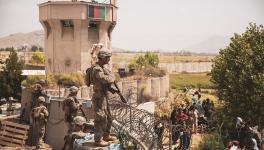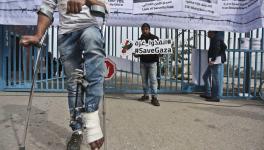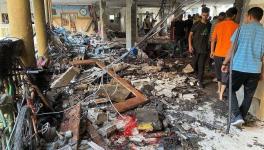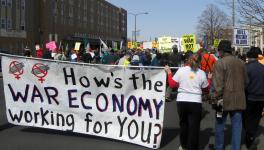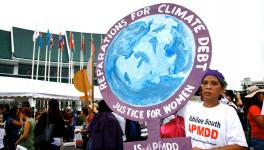Activists Expose Glencore’s Rotten Record on Workers’ Rights
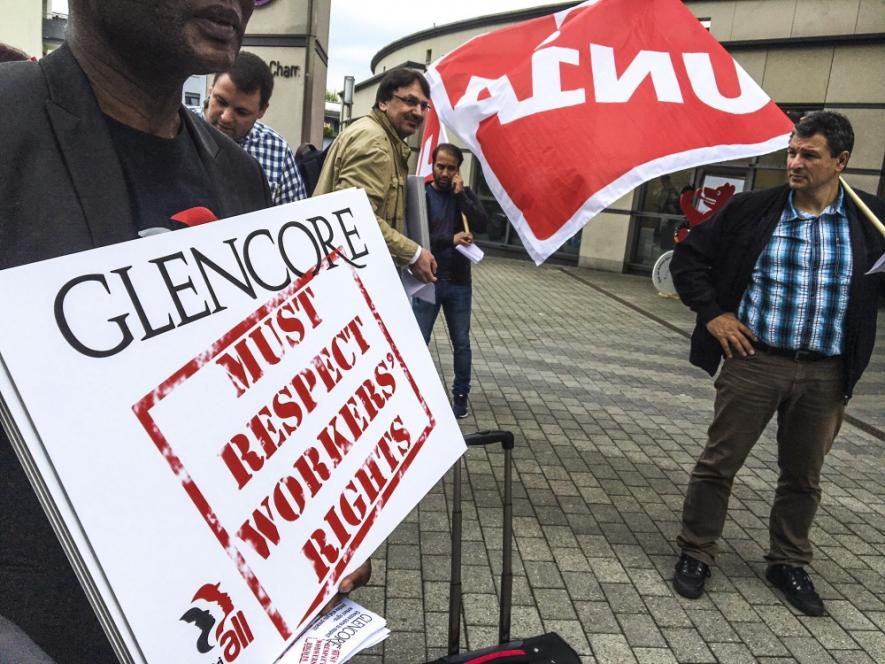
IndustriALL, a global federation of trade unions, representing more than 50 million workers in 140 countries, in partnership with The Europe-Third World Centre (CETIM), submitted an official statement to the United Nations Human Rights Council (UNHRC) on 27th June 2018 on the violations of workers’ human rights by Glencore, the Anglo-Swiss commodities giant. The letter focussed on Glencore’s labour violations and human rights abuses in a number of countries.
Speaking at the UNHRC meeting, IndustriALL campaigns director Adam Lee said:
“Glencore’s systematic practice of violating workers’ human rights around the world with almost total impunity highlights the urgent need for an international legally binding instrument allowing the regulation of transnational corporations′ activities and their impacts on human rights.
This instrument would also be an essential tool to guarantee access to justice for the victims and the affected communities.”
The meeting comes just a day after eight protesters were injured at Glencore’s South African Wonderkop chrome smelter. The protesters, who were demanding employment, had threatened to burn trucks that were entering and leaving the smelter. They were met with force, with guards using rubber bullets to disperse them.
Glencore is infamous for its violations of workers’ human rights in several countries where it owns mines, corruption and tax avoidance, as well as environmental damage caused by its mining operations in regions already affected by climate change.
Some of the countries where Glencore is in the dock are Congo, South Africa, Zambia, Peru, Philippines, Bolivia and Colombia, among many others.
For instance, in the Katanga mining company’s copper and cobalt mine in the Democratic Republic of Congo (DRC), in which Glencore has a 75% stake, seven workers were killed in a landslide on March 8, 2016. Glencore called the landslide a “geotechnical failure.” Only three bodies were recovered.
IndustriALL also received news of three deaths at Glencore’s Zambia operations in 2017, of which Glencore has publicly only reported one. IndustriALL representatives visited Glencore’s Zambia Mopani copper mines in March 2018 and talked to employees, where they verified the deaths. As many as 4,000 workers were also retrenched in Mopani in 2015, and the remaining workers were made to work 24 hours straight underground. Glencore, in 2017, went to the extent of threatening to close down the mine in case of even one fatality, effectively risking the lives and livelihoods of its workers.
In Phillipines, the company’s proposed Tampakan mine is believed to have displaced approximately 5,000 members of the B’laan tribe. The company admitted to having paid the armed forces, who assassinated indigenous activists who were opposing the protests. Glencore acquired 24,000 hectares of forest and agricultural land with the government’s consent. Since 2001, the company has been accused of being complicit in the murder of at least 10 indigenous people, including the wife and two children of an indigenous leader, at times taking the help of the country’s state police and armed forces, and at other times, funding paramilitary groups in the area.
Glencore refutes all these allegations, saying it follows the UN Guiding Principles on Business and Human Rights and has signed the Voluntary Principles on Security and Human Rights. But reality seems very different. Workers’ unions in many countries on several occasions have protested against the company’s illegal and inhumane practices.
The National Union of Metalworkers of South Africa (NUMSA) released a comprehensive statement in May 2018, condemning Glencore’s labour violations at home and around the world. The statement pointed to innumerable cases of abuses that Glencore visited upon workers in South Africa and The Democratic Republic of Congo (DRC). These include denial of basic workers’ rights, lower salaries for contracted workers, subjecting workers to dangerous health and safety conditions at the workplace and threats of dismissal, racism and discrimination.
Get the latest reports & analysis with people's perspective on Protests, movements & deep analytical videos, discussions of the current affairs in your Telegram app. Subscribe to NewsClick's Telegram channel & get Real-Time updates on stories, as they get published on our website.










